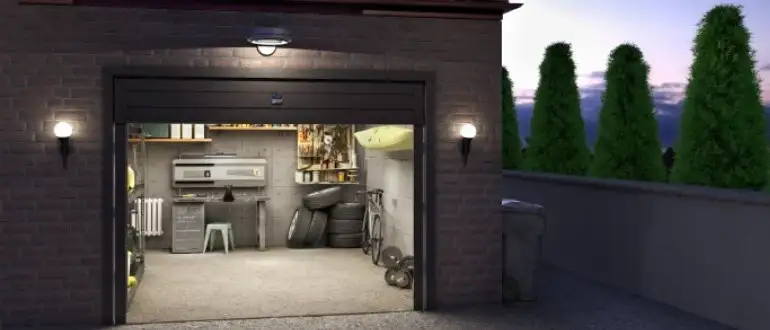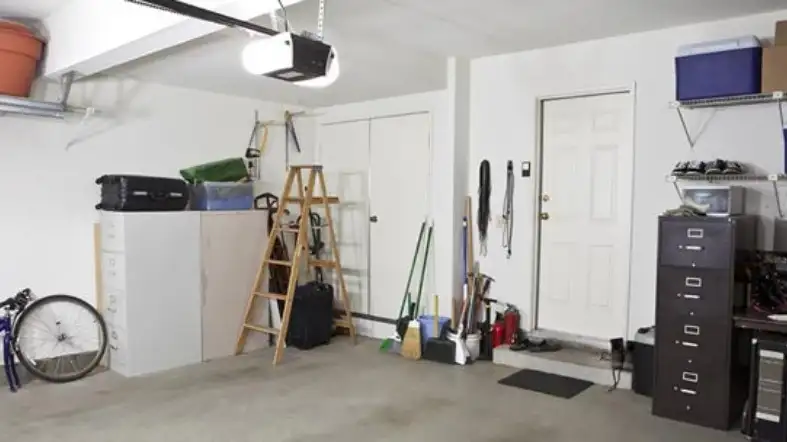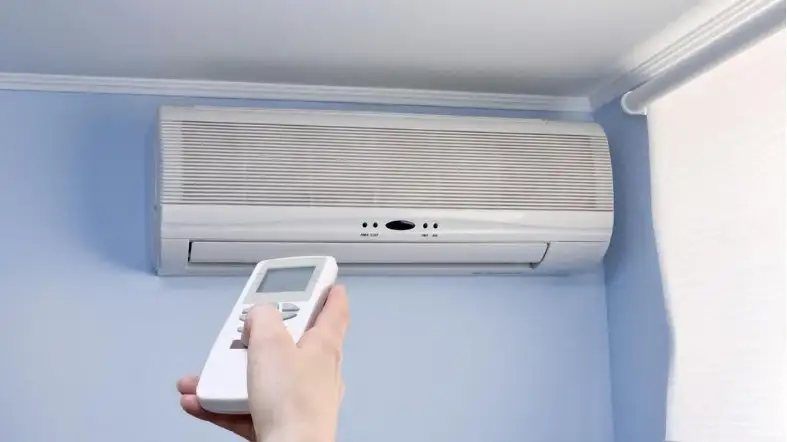Planning for an AC unit for your garage to continue working long days on summer holidays?
It’s a good idea to increase the productivity of the garage, but you must pick the right size AC unit for the garage to keep the atmosphere cool.
If you ask me what size AC unit I need for my garage, you should determine it on your own.
So if you need the right process to determine the perfect size of AC unit for your garage, you can help yourself out.

What Size AC Unit Do I Need For My Garage?
For every square foot, an adequately insulated garage typically needs 20 BTUs, an average insulated one needs 25 BTUs, and a poorly insulated garage demands 30 BTUs. For a garage, the size of the AC unit required is determined by the garage’s square footage and its insulation quality.
AC unit size chart for my garage :
| Garage Dimensions (feet) | Poor Insulation (BTUs) | Average Insulation (BTUs) | Good Insulation (BTUs) |
|---|---|---|---|
| 10 x 10 | 3,000 | 2,500 | 2,000 |
| 10 x 20 | 6,000 | 5,000 | 4,000 |
| 15 x 15 | 6,750 | 5,625 | 4,500 |
| 15 x 20 | 9,000 | 7,500 | 6,000 |
| 20 x 20 | 12,000 | 10,000 | 8,000 |
| 20 x 25 | 15,000 | 12,500 | 10,000 |
| 25 x 25 | 18,750 | 15,625 | 12,500 |
Different Types of AC Units Suitable for Garages
Here are some of the most common types of AC units that you can use for your garage:
Window AC Units
Window AC units are the ones that you install in a window. They are easy to install and relatively cheap. They can cool a small to medium-sized garage effectively.
They have some drawbacks. They can be noisy, block the natural light, and reduce the security of your garage.
They also need a window that can fit the unit, which might not be available in some garages.
Portable AC Units
Portable AC units are the ones that you can move around on wheels. They are also easy to install and relatively cheap.
They can cool a small to medium-sized garage effectively. However, they have some drawbacks.
They take up floor space, need a vent hose to exhaust the hot air outside, and can be noisy. They also have lower energy efficiency than other types of AC units.
Ductless Mini-Splits
Ductless mini-splits are the ones that have two parts: an indoor unit and an outdoor unit.
The indoor unit is mounted on the wall or ceiling of your garage, and the outdoor unit is placed outside your garage.
They are connected by a thin tube that carries the refrigerant. They are very efficient, quiet, and powerful. They can cool a large garage effectively.
They have some drawbacks. They are expensive, need professional installation, and might not match the aesthetics of your garage.
Central Air Systems
Central air systems are the ones that use ducts to distribute the cool air throughout your home and garage. They are very efficient, quiet, and powerful.
They can cool a large garage effectively. They have some drawbacks.
They are very expensive, need professional installation, and might not be compatible with your existing heating system.
How to Calculate the Exact AC Size for Your Garage?

Measuring Garage Dimensions
The first factor is the dimensions of your garage. You need to measure the length, width, and height of your garage in feet.
You also need to measure the area of any windows or doors in your garage in square feet.
Insulation Considerations
The second factor is the insulation level of your garage. You need to check how well insulated your garage walls, ceiling, floor, windows, and doors are.
You can use an insulation tester or a thermal camera to measure the insulation level of your garage.
Sunlight Exposure & Windows
The third factor is the sunlight exposure and windows of your garage.
You need to check how much sunlight enters your garage through the windows or skylights during the day.
You also need to check how much heat is gained or lost through the windows or skylights during the night.
Activities Performed in the Garage
The fourth factor is the activities performed in the garage. You need to check how much heat is generated by the people, machines, or appliances in your garage.
For example, if you use your garage as a workshop, you might have tools or machines that produce heat.
If you use your garage as a gym, you might have people who sweat and breathe out heat.
Existing Ventilation and Sealing
The fifth factor is the existing ventilation and sealing of your garage.
You need to check how much air flows in and out of your garage through vents, fans, cracks, or gaps. You also need to check how well sealed your garage is from air leaks.
To calculate the exact AC size for your garage, you need to add up all the heat gains and subtract all the heat losses from your garage.
To do this calculation, you can use an online calculator like this one. Or you can use a formula like this one:
Q=U×A×(Ti−To)+SHG×A×SC+3.4×H+CFM×1.08×(Ti−To)
You just need to plug in the values for each factor that you measured or estimated for your garage. You can use a calculator or a spreadsheet to do the math.
Once you have the net cooling load of your garage in BTUs per hour, you can divide it by the number of hours you want to run your AC unit per day.
For example, if your net cooling load is 15,000 BTUs per hour, and you want to run your AC unit for 8 hours per day, you need an AC size of 15,000 x 8 = 120,000 BTUs per day.

Factors Influencing AC Size Selection for Your Garage
Purpose of the Garage
How you use your garage affects your AC choice. Storage garages may need a weaker AC. You’ll use it when it’s extremely hot or cold.
Workspaces demand stronger AC units. Comfort for you and your tools is vital. You’ll use the AC often. If it’s a gym, you’ll need a powerful unit.
Cool conditions during workouts are essential. You might run it all the time.
Location & Climate
Where you live and your area’s climate play big roles. Hot climates need bigger units. Your garage needs to stay cool. You’ll use the AC more during summer.
Cold climates might need smaller units. It should be pleasant without freezing. Winter might see less AC use.

Energy Efficiency
Energy usage is crucial. Saving energy means maybe choosing a smaller unit. Improving insulation helps too. But too small an AC works harder.
That increases energy use. Look for a high SEER rating. A higher rating means more efficiency. Some units have ratings of 25 or more.
They cost more but save money later.
Budget Constraints
Money matters when choosing an AC. Tight budgets might lean towards window units. They’re cheaper and you can install them yourself.
But they might cost more in the long run. If money’s less of an issue, ductless mini-splits might work. They cool better but might need professional installation.
Online calculators can help compare costs.
Noise Considerations
Noise levels are vital. For a quiet garage, consider ductless mini-splits. They’re quieter and less disruptive. But quiet might mean less cooling power.
Window units are noisier. Yet, they might cool better. Look at the dB rating. Lower ratings are quieter. Aim for 55 dB or lower for peace.
Longevity & Warranty
The durability of your AC counts. Ductless mini-splits might last longer. They’re built to last but might cost more.
Window units are cheaper but may not last as long. Warranty periods are important too. Longer warranties give peace of mind.
Some last 10 years or more. Customer reviews can also guide your choice.
FAQs on What Size AC Unit I Need For My Garage
Can I install an AC unit in my garage myself, or do I need to hire a professional?
While it’s possible to install an AC unit in your garage yourself, it’s recommended to hire a professional to ensure that the unit is installed correctly and safely.
Is it necessary to have an AC unit in my garage?
It depends on your personal preferences and how you plan to use your garage.
How much does an AC unit for a garage cost?
On average, a window unit can cost anywhere from $100 to $500, while a central AC unit can cost several thousand dollars.
Can I use a portable AC unit in my garage?
Yes, a portable AC unit can be a good option for cooling a garage.
Final words
Selecting the right AC size for your garage hinges on various factors. Consider your garage’s purpose, location, and your budget.
Remember, energy efficiency and noise levels also play vital roles. Always balance your needs with your budget to make an informed decision.
Your comfort and efficiency depend on it.
